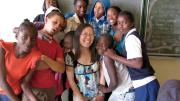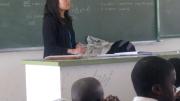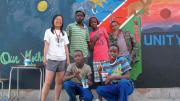It took 15 minutes to walk to town. I went across the sand, out the school gates to a path through the tall, feathery savanna grass (Are there snakes? I’d asked a student once, and he said yes. Then, with glee—Are you afraid?). Next, the dusty, unpaved road through the dry riverbed; another student showed me how to dig and find water just below the surface. On the other side was the one road through the town of Omaruru in central Namibia, and next to the municipal building was the supermarket, Spar.
Under the warm yellow lights among the well-stocked shelves I found, on one occasion, cupcake tins and a grapefruit fork, and the presence of these objects struck me as peculiar, and stayed with me.
Other oddities, carefully catalogued and considered:
I sat halfway in the aisle of a crowded combi as it sped down wide, open roads to the coast. Outside, termite mounds and stunted trees interrupted kilometers of vast savanna and the perpetually cloudless sky; inside, Rihanna’s “Rude Boy” blasted over the speakers.
In class, my students jabbered in three or four tribal languages, but they’d seen Rubik’s Cubes and watched detective shows. A few friended me on Facebook via their (school-banned) cell phones.
My most bizarre finding: nightly on television, after the national news, came India–A Love Story, a soap opera with a cult following, its Brazilian-and-Indian plotline, originally broadcast in Portuguese, dubbed to English for its Namibian run. On Saturday they replayed all the week’s episodes.
All this made me wonder how big the world really is, and what it would take to be far away.
I was supposed to be far away. In winter of my sophomore year I started feeling hemmed in, driven into a narrowing spiral of specialization and professionalization. I’d always told myself I wanted to be a scientist, but science shrank into biology and then systems biology, and I began to realize that being a systems biologist, or in fact “being” anything, might mean I’d be stuck there, caterpillar to unwilling butterfly. So when I felt the looming halfway point of college, when I realized I might be in lab for all my college summers and unfathomable years beyond, I sprinted cold-footed and unceremoniously in the opposite direction.
Namibia seemed far enough. I wanted to be out of the shadow of Harvard, because Harvard confused me. I felt the lingo on my tongue, the uneasy restlessness and anxiety, the feeling of always trying to race ahead, destination irrelevant. I wasn’t sure anymore what was me and what was Harvard, and I hoped that by flinging myself to a faraway place I would start to find things out, what’s left when familiarity and habit are stripped away, what is essential.
So when I heard about WorldTeach from a friend, I went for it. A summer teaching in Namibia—far enough away, a comfortable span of time. I’d never traveled abroad alone, but Namibia promised novelty and adventure, and I relished the idea of a challenge. I had no formal classroom experience, but teaching felt oddly compelling, because I wanted to return to what made me fall in love with science.
In the days before leaving, I played a game with myself, trying to imagine what I’d find. But I couldn’t picture anything—little things, like the style of buildings or how people would dress; big things, like the landscape and the size of a town of four thousand. I wasn’t sure what I’d eat, or how well Namibians would speak English. I didn’t know what subjects I’d be teaching, couldn’t fathom how I would spend my day. And I found the blankness, the not-knowing, to be exhilarating.
And sometimes terrifying. I got shots and took malaria pills, registered with the embassy and grimly copied down emergency information, started to feel a gaping sense of distance. My parents thought I was crazy to go. Just before leaving, I started to agree.
My first day teaching, I played substitute. First period, I found out when they walked in, was grade eight agriculture, currently studying cash crops—cowpea harvest practices, soil conditions for wheat. I spotted a mercifully familiar poster on the classroom wall and invented a lesson plan on the spot. The cell-parts dance I’d learned in seventh grade garnered international approval.
Days and weeks later, I found myself teaching my grade eight math classes that King Henry Died By Drinking Chocolate Milk—grade nine physical sciences got an earful about metric prefixes, too, after I started grading their tests. When we learned about states of matter, I brought in oobleck—a suspension of cornstarch in water—the non-Newtonian fluid of choice back in elementary school. I reminded my math classes endlessly that Cartesian coordinates were over, then up, over, then up, walking across to the ladder and then climbing up, hearing echoes of my fifth-grade teacher all the while. Memories of classroom Jeopardy games and the arithmetic order of operations—Please Excuse My Dear Aunt Sally—surfaced from the deep. Just when I’d thought I was taking on a new role, I became a chimera of every teacher I’d ever had.
And so I started to feel the weight of other places, and because of their nearness I wondered if I was truly in Africa. I was still in the grip of a Cantabrigian busyness, filling my free time with school websites and mural designs, excuses to never be still. When I walked through town, I heard calls of “China,” and the first question my students asked was where I was really from.
I found I’d brought more than I knew. Packed alongside my clothes and books was a whole self neatly transplanted from America, a person with habits and expectations, familiar routines and stories and patterns of thought. For all the mystique I’d attached to the idea of place, to the power of difference and novelty and strangeness to provide a blank slate and a new start, it was I who’d never left.
In August, when I went home, I kept waking up early. One morning I went out walking, and I couldn’t stop noticing the hot, humid air and fluffy white clouds, the tiny, bright flowers by the curbs and the lush green of Tennessee summer, and for the first time I was hit with the full realization of its beauty. Then I knew I’d been away.
The things I realized, which in retrospect seem obvious:
Teaching is hard and exhausting. Teaching well even more so.
The world is big. Before this summer, Namibia was at best a vague concept in my mind, but it was my students’ entire reality. Namibia has far more detail and complexity than I could’ve imagined, and when I left, I still felt like I knew nothing. The world is big, and in comparison, the everyday stresses of papers and problem sets and extracurriculars seem very, very small.
The feelings that drove me to flee Cambridge are still there. My uncertainty about the future didn’t go away because I tried to go away. But nothing threatens to overwhelm me. I took a break, and it was okay. Africa was different from what I’d expected, and that was okay. I felt amazing after some classes and felt like crying after others, got sick and missed a week of school, climbed a mountain and sprained my ankle at the top, and through all of that I was okay. Things will stay okay.
I left Cambridge but I came back, and in between I learned about all the things I carried with me while I was gone—my past experiences, my pattern of thoughts, everything that has influenced me indirectly and unconsciously—so that sometimes I hardly knew who or where I was.
And in the end I took this, the fact that I will always carry things with me, to mean that even though I’ll never have a pure self free of influence and circumstance, even though I’ll never isolate some essential me, there’s something I can hold onto in the face of everything, everything happening around me, everything that directly or indirectly tries to affect me; some small space to scratch out and keep free. And somehow I found that to be enough.











